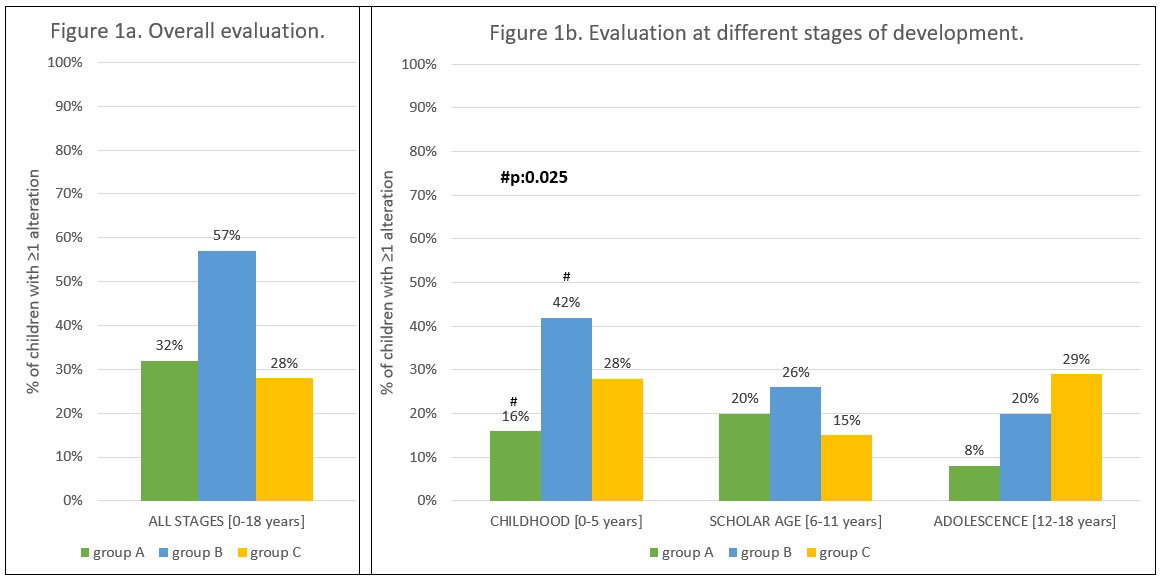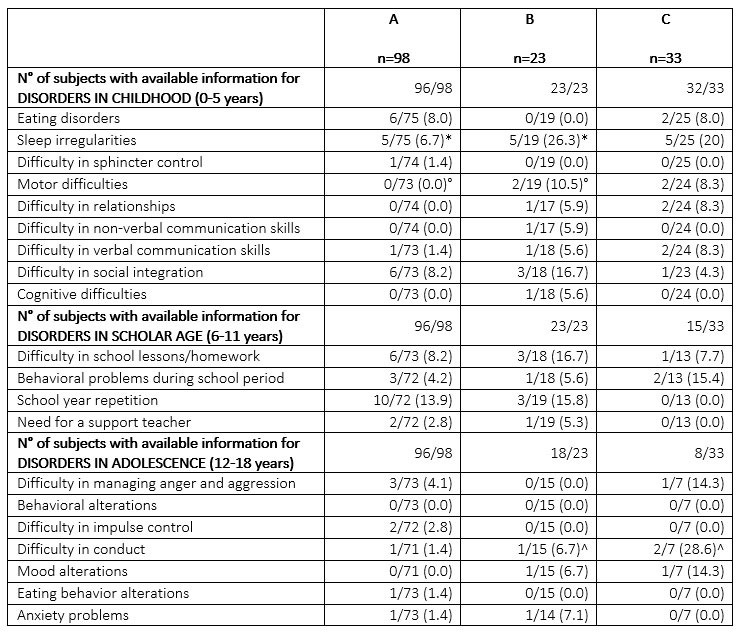Session Information
Session Type: Poster Session B
Session Time: 9:00AM-10:30AM
Background/Purpose: In the last years, the rate of successful pregnancies has significantly increased in Systemic Sclerosis (SSc)1 women. However, the long-term outcome of their children remains an unexplored issue. Our aim is to evaluate the neuropsychiatric (NP) outcome of children born to SSc mothers.
Methods: An ad-hoc questionnaire, regarding different aspects of child’s neurodevelopment (ND) (3 sections: childhood [0-5 years]; scholar age [6-11 years]; adolescence [12-18 years]), was created and administered to female SSc patients (ACR/EULAR 2013 criteria) attending our outpatient clinic during 2021 and who had at least 1 child. Children’s NP characteristics were compared between 3 subgroups: A) born >10 years before SSc diagnosis; B) born £10 years before SSc diagnosis; C) born after SSc diagnosis. Results below are expressed as number/total number of answers collected for each question.
Results: 100 SSc women reported 189 pregnancies: 152 resulted in 154 live births (2 twin pregnancies, M/F=85/69). Deliveries occurred at a median of 39 (36-40) weeks of gestation: 28% of preterm births and 6% of severe preterm births (< 34 weeks of gestation). At least one NP alteration was reported in 42/119 (35%) subjects, more frequently in group B (57%), as compared to group A (32%, p:0.07) and group C (28%, p:0.09) (Figure 1). Sleep irregularities were the most frequently reported disorder (n=15). Comparisons between the 3 subgroups for each NP outcome are shown in Table 1: overall, a higher rate of NP alterations were reported in children of group B. A higher rate (12%) of severe preterm birth was observed in babies born in group C. In addition, SSc mothers declared that 7/123 (6%) children underwent a NP evaluation leading to a diagnosis in 3 cases: 1 cognitive delay, 1 learning disability (LD) and 1 autism spectrum disorder (ASD). These children were born 1 and 5 years before and 3 years after SSc diagnosis, respectively.
Conclusion: Children born to SSc mothers had a frequency of major NP alterations (cognitive delay, LD, ASD) similar to general pediatric population2. A higher frequency of minor ND disorders, especially sleep irregularities, was observed in children within 10 years before maternal diagnosis, possibly suggesting an impact of maternal chronic disease on the relationship with child in the first years of life. To confirm these self-reported preliminary data, the extension of the study will consist in a NP specialistic evaluation proposed to the offspring of SSc mothers aged £18 years.
GILS (Gruppo Italiano Lotta Sclerodermia) is kindly acknowledged for supporting the study with a grant.
Results are presented as number/total number (%) of answers collected for each question. Variables were compared by Chi Squared/exact Fisher test. *p=0.03; °p=0.04; ^p=0.02.
To cite this abstract in AMA style:
Pedretti E, Andreoli L, Moschetti L, Nalli C, Molinaro A, Galli J, Fazzi E, Franceschini F, Tincani A, Airò P, Lazzaroni M. Neuropsychological Outcome of Children Born to Women with Systemic Sclerosis: Assessment Through a Self-administered Multidisciplinary Questionnaire in a Monocentric Cohort [abstract]. Arthritis Rheumatol. 2022; 74 (suppl 9). https://acrabstracts.org/abstract/neuropsychological-outcome-of-children-born-to-women-with-systemic-sclerosis-assessment-through-a-self-administered-multidisciplinary-questionnaire-in-a-monocentric-cohort/. Accessed .« Back to ACR Convergence 2022
ACR Meeting Abstracts - https://acrabstracts.org/abstract/neuropsychological-outcome-of-children-born-to-women-with-systemic-sclerosis-assessment-through-a-self-administered-multidisciplinary-questionnaire-in-a-monocentric-cohort/


